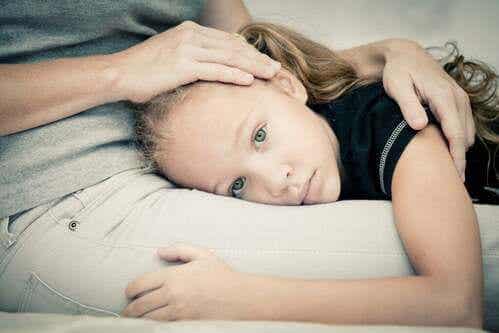How we were loved as children often explains how we give and seek love. Even if in childhood we were brought up in a cold and painful way, we always have time to break this affective pattern. We talk about it in this article.

Written and verified by the psychologist GetPersonalGrowth.
Last update: 15 November 2022
We've all heard the phrase "get the love you deserve". The truth is that how we were loved as children in many cases determines our emotional relationships as adults. Much of our relationships and their quality is mediated by the bond established with parents.
It has been more than fifty years since psychologist Albert Ellis pointed out that the moment parental love ceases to be unconditional, problems appear in the child's emotional development. Those early models of validation, affection or disaffection build the first perception of interpersonal relationships.
Whether we like it or not, it is in childhood and adolescence that our idea of love is formed. Enriching previous experiences gives us security and confidence. A childhood made up of shortcomings and fears will make us hungry (but also fearful) of any form of love.
Research tells us that having loving parents allows us to develop stronger and happier relationships in adulthood.
How it affects how we were loved as children
Giving your baby healthy love is just as important as feeding him, caring for him and giving him a home. It is also true that there is no manual for being perfect parents, but it is essential that our children feel loved and that this love is unconditional, so as to make them feel accompanied and safe in all circumstances.
How we were loved as children determines us, for better or for worse. A study conducted by Harvard University shows that parental affection affects the psychological development of children.
On the other hand, being a victim of abuse, neglect and lack of attachment favors the emergence of mental health problems during adulthood.
Everything that happens in childhood has repercussions on adulthood. For instance, being overprotective makes children sensitive and anxious. Children who are physically and psychologically abused often have a hard time showing feelings.
Likewise, episodes of violence experienced on one's own skin or observed within the family affect future relationships.
Impact of attachment styles on adulthood
One of the most common theories as to why the way we were loved as children determines our adult life is that of psychologists Cindy Hazan and Phillip Shaver.
In the late 80s, they set forth their theory of love in a study based on the different types of attachment defined by psychiatrist and psychoanalyst John Bowlby. These are:
- Insecure-ambivalent. One or both parents show an unpredictable attitude towards the child. Sometimes they are available and affectionate, others can be cold, aggressive or inattentive towards her. This causes them to become jealous, apprehensive, fearful of being abandoned, insecure and even contradictory adults; or fickle people, one day very present, another very distant.
- Insecure-avoidant. Another type of problematic attachment is one in which the child's demands and needs are neglected. The child is ridiculed and considered weak when he expresses the need for closeness and affection.
His emotions are invalidated, his personality, dignity and self-esteem are violated. It is evident how this type of attachment affects the adult: for him, affection becomes a threat, love hurts and betrays, so it is best to avoid it. He rarely will he achieve genuine intimacy with anyone.
- Disorganized. It is the most harmful attachment. In this case, the parents are violent and cause a real trauma in the child's mind. The effect that this attachment can have on a relational level in the future is very complex and even contradictory: instability, lack of trust, a need for excessive attachment appear.
- Sure. This attachment is established with parents capable of offering security in all areas and is characterized by general well-being. Those who grow up feeling loved are more likely to become an adult capable of love.
The way we have been loved is not always what we deserve
The way we were loved as children affects us in some way, it's true. Some of our parents use the opportunity to teach the value and warmth of hugs. Others educate with shouting and emotional reinforcement. They give their children wings to fly or chains, making them think they don't deserve to fight for their dreams.
Their words creep into our minds, sometimes even during adulthood. All of this psychological inheritance has an impact on how we love our partner.
So, are we prisoners of the education and treatment received in childhood? It shouldn't be that way. We always have time to break that model and those patterns.
Everyone deserves a fulfilling, positive, and healthy love. However, we will not be able to receive it if we do not deem ourselves worthy of it. And to achieve this, we have to start with being our best friends. Self-esteem and self-love will be able to heal many childhood wounds.
Only by truly loving ourselves will we be able to love others in a mature way and build happy and stable relationships.


























